(VIDEO): One-Way Traffic at Split Ferry Port In Effect from Today
The new traffic regulation at the Split Ferry Port came into effect at 4 am on Tuesday morning, reports Splitski Dnevnik on June 18, 2019.
The biggest announcement is an entirely one-way Zvonimirova Street, completely one-way traffic through the City Port, with no turn to Zagrebačka Street from the direction of the Port.
Thus, Zvonimirova street, just like last year, will be one-way, and four lanes will continue toward the city harbor. However, exiting the port will take place in only one direction, via the Bačvice bridge. The lanes at the bus station are now turned the opposite direction, considering all buses will travel to Jadranska Street.
Furthermore, there will be a big bus stop at Gat Svetog Duje instead of the current roundabout and four new disabled parking places, and a new bus stop at Bijankinijeva Street. The flow of traffic will also change below the Koteks skyscraper. You can watch the video detailing it all below.
The traffic lights at the intersection of Zvonimirova and Zagrebačka Street next to the Bishop’s Palace are being programmed for the new traffic regulation and will provide a better flow of pedestrians at this intersection with a better flow of vehicles. It is important to note the changes in traffic flow in the lower part of Tolstojeva Street, where it is no longer possible to enter Tolstojeva Street from Zagrebačka, but only from Zagrebačka to Tolstojeva to the intersection with Ul. kneza Višeslava and further to Držićeva. The traffic flow has also changed at Ul. Sv. Petra Starog where vehicles can travel from the intersection next to the police station one-way to the Bishop's Palace.
With this solution, the Split Ferry Port is more open to public transport and has joined forces with Promet to coordinate their lines with a new timetable. Promet buses will be adapted to the new traffic regulations and will increase their number of operations from the Port from 160 to 509.
The project was carried out by a number of experts including Trivium and the Faculty of Civil Engineering, Architecture and Geodesy Split, according to the joint request of the City of Split, Croatian Roads and the Port Authority, to achieve a better flow of vehicles and thus solve the problems of congestion at the Ferry Port in the summer months.
"The traffic analyzes of this project have shown an enormous capacity with the new solution and with its implementation, we do not expect any significant traffic approaching the City Port. The City of Split, in cooperation with the relevant Ministry of the Sea, Transport and Infrastructure and the state-owned companies (Croatian Roads, Croatian Railways and the Port of Split), operates a one-way traffic regulation in the center of the city and strengthens public transport, and especially the railways,” said deputy mayor of Split Nino Vela and added:
"We have introduced one-way traffic flow through Zvonimirova Street and the City Port, which improves the flow by more than two times, and introduces three times as many public bus lines through the City Port, which will increase the number of passengers in the City Port by three times (from the current 15,000 to 45 000). We also include the metro as public transport on the line from the City Port to Kopilica, which runs every 20 minutes for the fastest and most comfortable entry and exit of passengers to the City Port.“
To read more about travel in Croatia, follow TCN’s dedicated page.
Split Mayor Publishes '10 Golden Rules' for Tourists this Year
June 16, 2019 - Split Mayor Andro Krstulović Opara sent a message to Split's guests this year, accompanied by a poster clearly displaying what guests should not do while visiting the city.
Here's this year's message via Opara's official Facebook page:
“Welcome to our dear guests,
Turn off your everyday life, take a deep breath, and immerse yourself in the magical world this ancient city offers. Relax and let the spirit of Split take you in because it will be an unforgettable experience of an open Mediterranean town. To ensure you can talk about Split as an experience you’ll want to repeat after you get home, I will help you with 10 golden rules on navigating the Split mentality and Split landmarks:
1. ‘Pomalo’ is a word that you will hear often. This is a town where no one hurries, so there is no need to be anxious if it is not right now. Pomalo, it’ll be, and when it is, it will be great. After all, you are on holiday.
2. I reminded our dear guests of ‘pižolot’ last year, and I don’t want you to forget. What a siesta is to Spain, pižolot is to us, an afternoon break from 2 pm to 5 pm. The sun is too strong, the temperature is too high and it's time to relax to get the strength for an evening out.
3. Along with ‘pomalo’ and ‘pižolot’ is ‘fjaka’. With great satisfaction, people here interpret it as 'a state of mind with a strong will to do nothing'. As the sun sets, the fjaka sets in, and the energy awakens.
4. On hot days, run to the beach. A clean sea in the very center of the city is something big cities can rarely boast. Can you recall the last time you swam in the sea in the heart of a big city?
5. Picigin is played throughout the year, only in Split and only at one beach. Bačvice. We even have a World Championship in picigin. To ensure you don’t regret this later, put a towel under your arm, slip on your sandals, go to Bačvice, and find a spot in the sand where you can watch the tireless effort of players as they insist on not dropping the ball in the sea. If you are fit and good at acrobatics, try a game of picigin yourself.
6. The fan spirit of Split is the opposite of the state described by the terms “pomalo” and "fjaka". The people of Split are extraordinary fans, there is always an atmosphere, and in every sport, we play for all or nothing. Of course, the most attractive fans are at the Hajduk football games, but do not miss any sporting event. Become a part of Split.
7. I mentioned the football club whose features you will find in many public areas around Split. Do not mess with them because Hajduk is a saint. Full stop.
8. Split also has other saints: the Cathedral of St. Duje, Marjan hill, Diocletian's Palace. We are reviving them and want to preserve them for the future generations of Split citizens and their guests. With your help, help us and support us in that purpose. Let's protect our heritage and world heritage together. This year, we will mark 40 years since Diocletian's Palace and its historic city core was listed in UNESCO.
9. Like all Mediterranean people, we are loud, but we do not like noise when we are resting. Especially at night and especially below our windows. We know that you are on holiday and you want to celebrate, but don’t do it by blasting loud music in your apartment, because people around you need a break to make sure they can be at your service and the service of other guests tomorrow.
10. At our beaches, you wear swimsuits, and everywhere else the appropriate clothes for this time of year. Walking around the city without clothes or a piece of clothing, or just in a swimsuit will see you pay a fine of 500 kuna right away or 1,000 kuna after the misdemeanor procedure has been carried out. Why would you give up a dozen pizzas or 20 beers when you have some 30 kilometers of beaches in Split where you can show off your figure?
Dear guests,
Our tourism professionals will do everything to make sure you have an enjoyable and memorable holiday. The people of Split are extraordinary hosts, will give you their soul and take your heart, and all that they seek in return is respect for their wellbeing and our heritage, inheritance, and customs. I conclude with a short formula for a great vacation, getaway, and experience: enjoy and respect us. And it will be great.”
To read more about travel in Croatia, follow TCN’s dedicated page.
Hello, Summer: 140,000 Passengers through Split Ferry Port and Airport this Weekend
After the weird weather in May dimmed our hopes of summer making it to Split this year at all, we can officially say that the sun is out, we’re sweating, and summer is here. And boy, is it busy.
June 15th officially marks the start to the season, and it was welcomed in Croatia this year no differently than most others - with crowds. Recall, the Croatian Tourist Board flocked to the busiest border crossings in Croatia on Saturday to distribute 50,000 water bottles to tourists, as a “welcome to Croatia” gesture. Though 50,000 water bottles barely made a dent.
Back on the coast, the tourist season is heating up, too, and the figures revealed that 140,000 passengers would travel through the Split airport and ferry port this weekend, reports Splitski Dnevnik on June 15, 2019.
Namely, this weekend, a total of 184 aircraft will take off and land at Split Airport, which translates into 45,000 passengers.
Mate Melvan of the Split Airport told Hina that only 104 aircraft with 25,000 passengers in both directions were announced on Saturday, while 80 aircraft and 20,000 passengers are expected on Sunday.
"In the first five months of this year, 588,012 passengers passed through our airport, which is an increase of eight percent over the same period last year," Melvan said.
But traffic is no less impressive at the Split ferry port, where 95,000 passengers and more than 7,000 vehicles will travel from Friday to Sunday. The interest for travel is so great, that on Saturday they introduced an extra line for Supetar on the island Brač.
“There are still no ‘big’ crowds and all of our lines have sailed on schedule since Friday; this is usual for this time of the year,” said Jelena Ivuljić of Jadrolinija.
Recall, the new one-way traffic regulation will be implemented at the ferry port from Monday, June 17, and the new city 'metro' from Kopilica to the ferry port is in full swing.
To read more about travel in Croatia, follow TCN’s dedicated page.
PHOTOS: 9th Split Pride Welcomes Biggest Crowd Yet
June 15, 2019 - On Saturday, June 15, the 9th Split Pride parade was held. From Đardin, members of the LGBT community in Split and hundreds of their biggest supporters marched through the city.
The organizer of Split Pride, Mirta Barić, said that Pride will continue to fight prejudice, anti-discrimination, and fear. Brtić also pointed out that they wanted to send a message to everyone that the LGBT community in this city exists, and it’s not going anywhere.
Pride expected around 300 people on the route from Đardin to the Riva and back to Đardin. There were unofficial reports of more than 250 police officers in Split throughout the day.
You can see photos and videos of the event courtesy of Mirela Rus below.
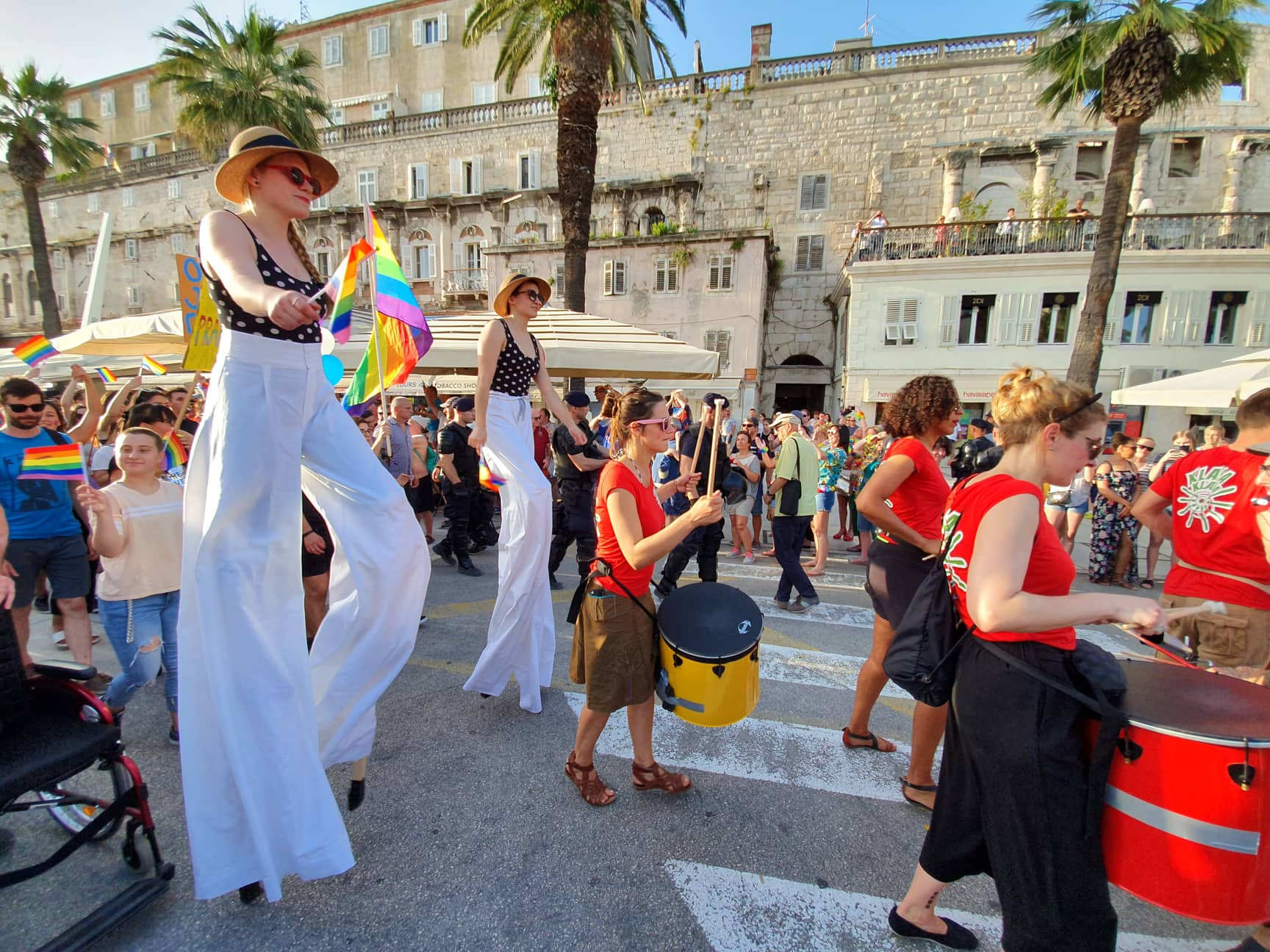
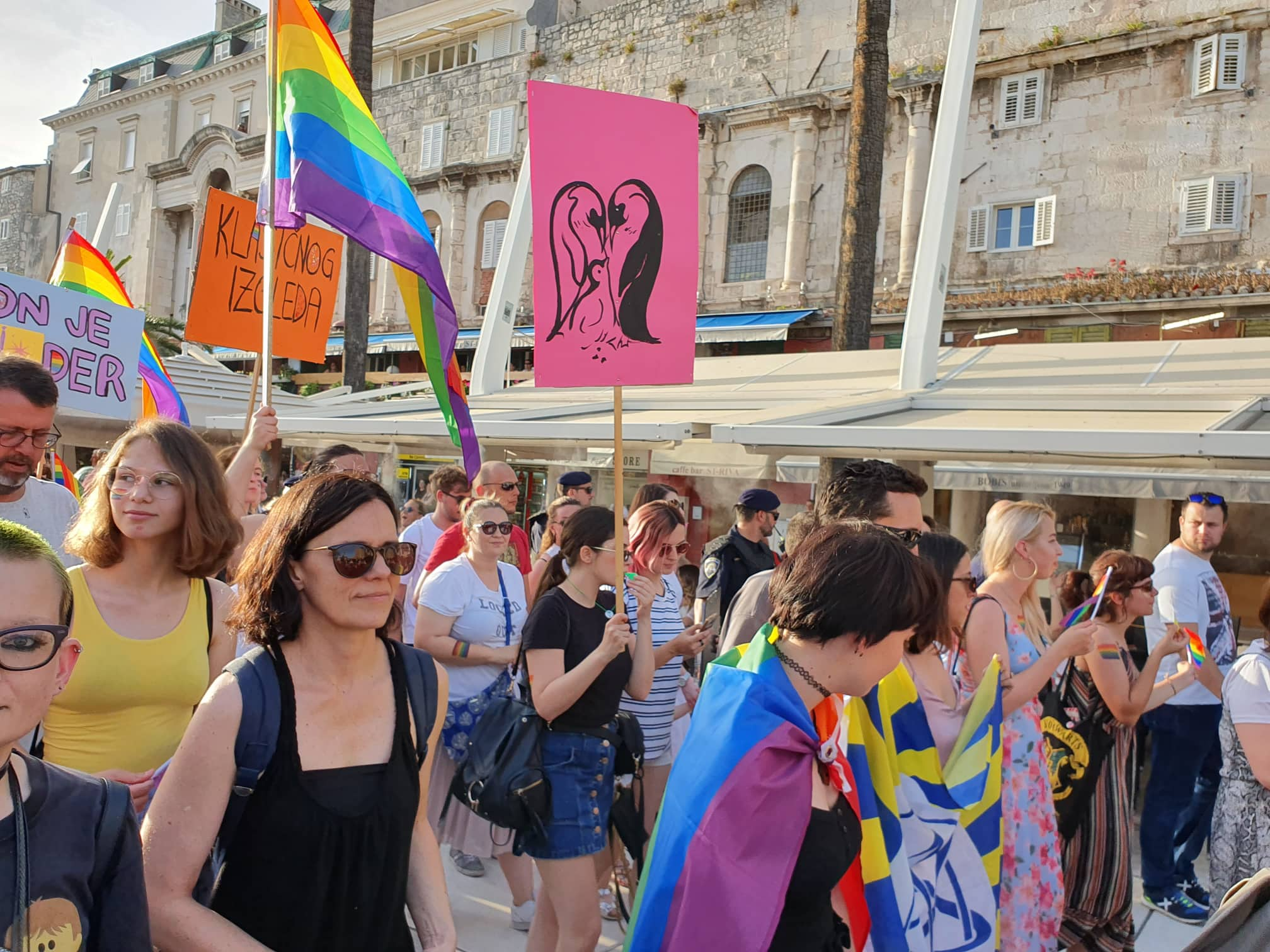
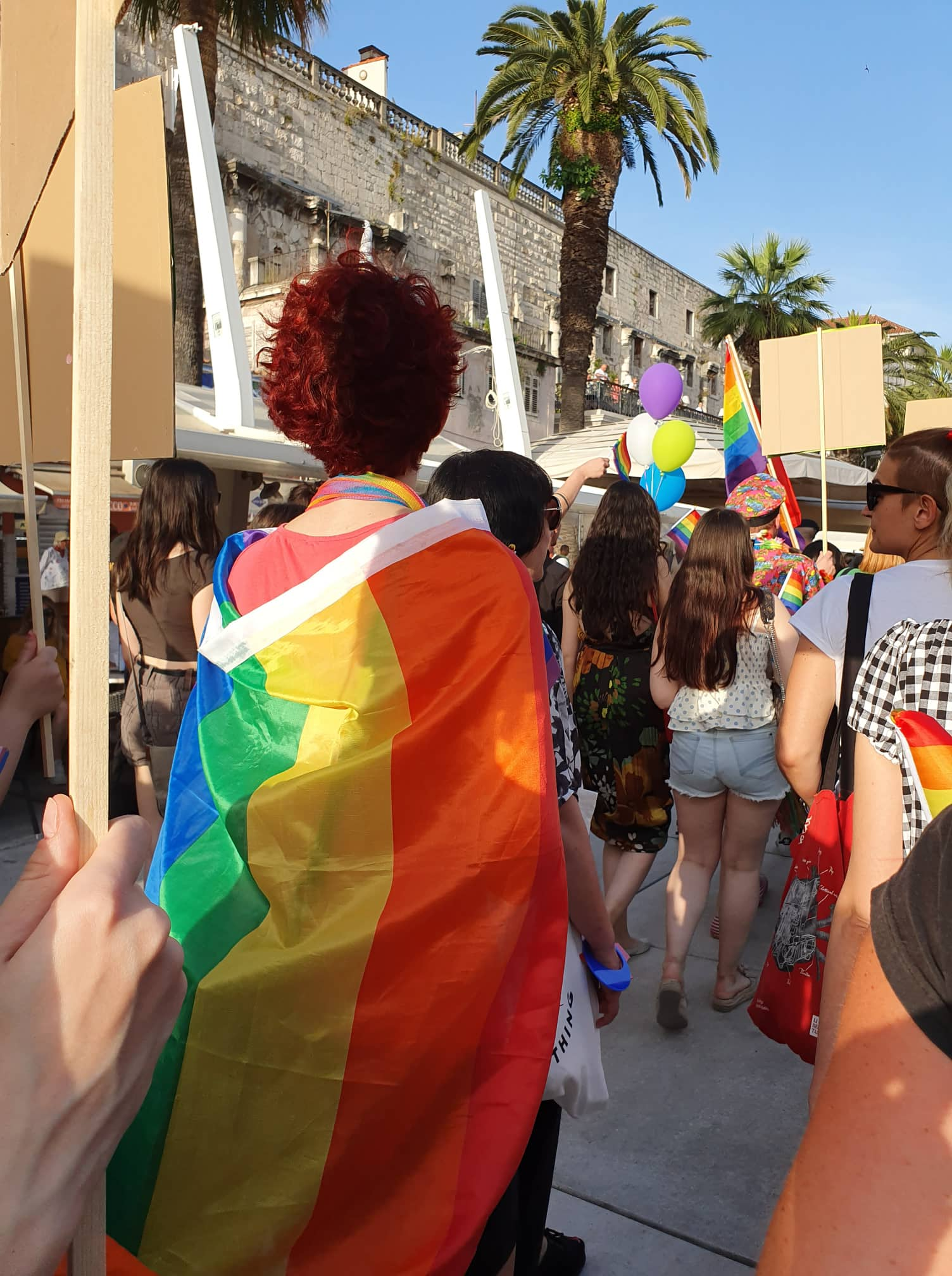
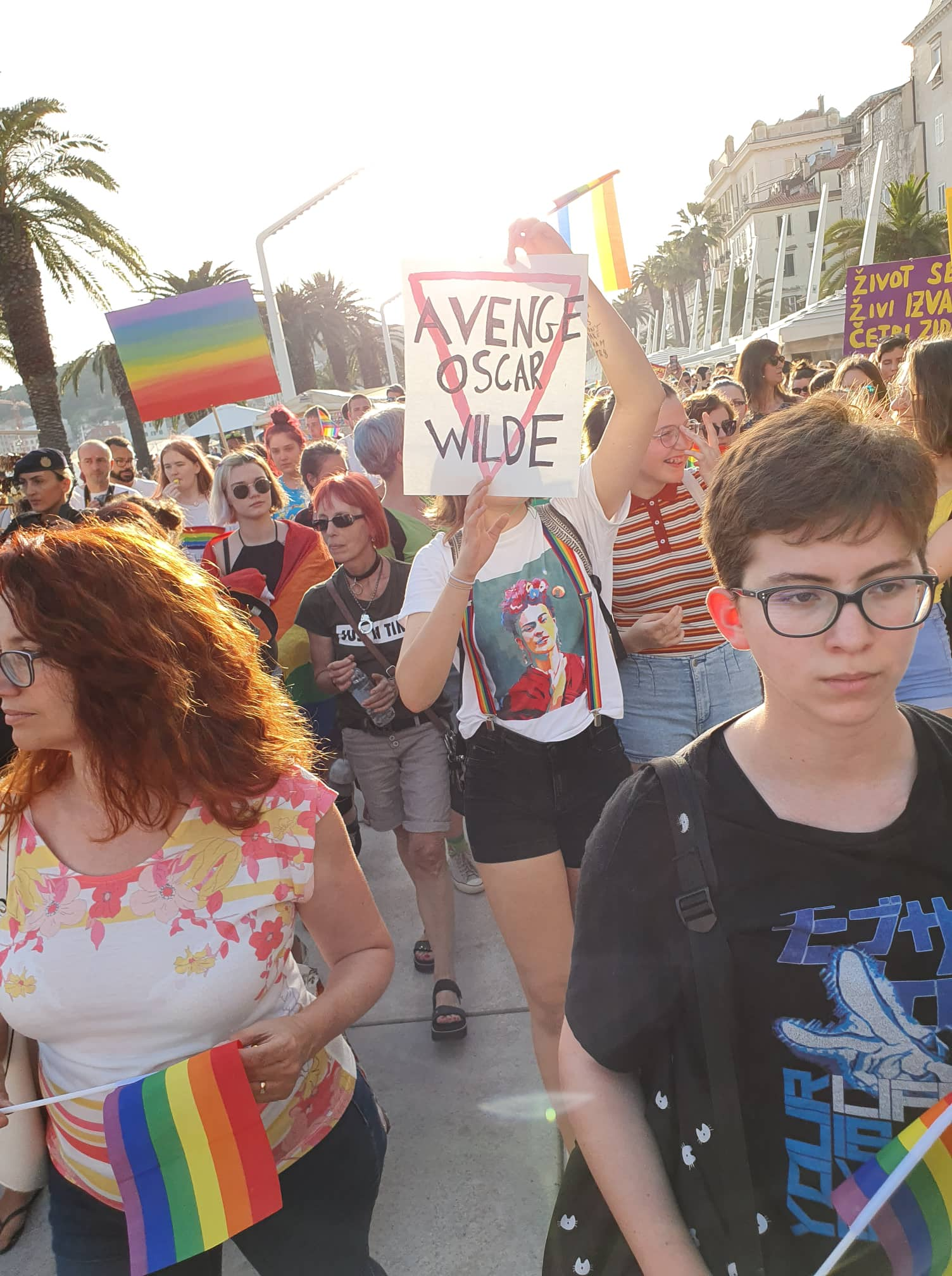
To read more about lifestyle in Croatia, follow TCN's dedicated page.
Diocletian's Palace Celebrates 40 Years of UNESCO Protection with Unique Menu
June 15, 2019 - 40 years of UNESCO's protection of Diocletian's Palace was marked in Split by an extraordinary menu crafted by Portofino and Olja Martinić.
Garum is a fermented fish sauce that was a popular delicacy at the time of the Roman Empire, which is formed of the bacterial fermentation of the internal organs of fish.
Thanks to the remnants of this sauce found in the amphora at several different locations, scientists have been able to reconstruct the recipe. For the needs of the inhabitants of the Imperial Palace, garum was produced in the Split maritime zone, while the wealthy foodies bought expensive garum produced in Italy, Greece or the Spanish garum factories.
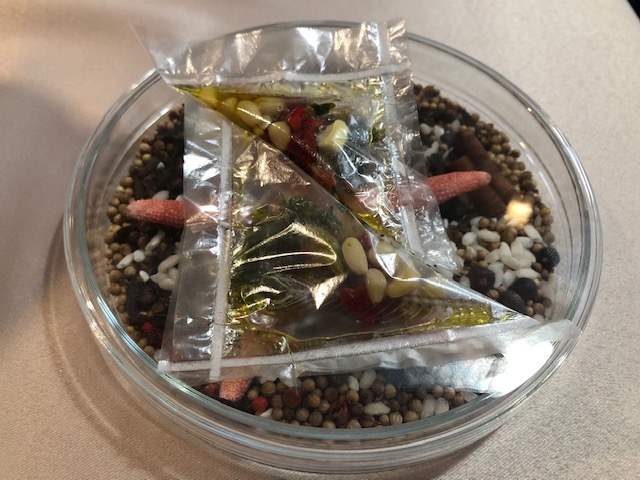
Matea Višić
Thanks to Portofino Steak, Pasta & Seafood in Split, after several hundred years, garum is once again on the plates inside of Diocletian's Palace.
Namely, on Friday, a spectacular themed 'Imperial lunch' was crafted in Split to celebrate 40 years of the UNESCO protection of Diocletian's Palace.
“To bring food into focus to show the importance of Diocletian's palace and the restaurants that are in its heart, we decided to create a menu that can only be enjoyed in a restaurant that has three or more Michelin stars. Every real restaurant must produce garum itself, as there are no longer any factories as there used to be,” said nutritionist, dietician and organizer of the event, Olja Martinić, for Dalmacija Danas.
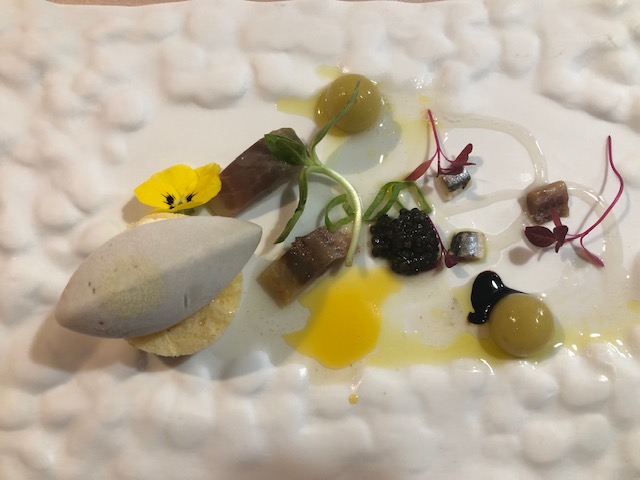
Matea Višić
Each plate was crafted and prepared by the culinary team headed by boss Marko Đurašin, and each dish, which was never before prepared in this way in the city under Marjan, were further refined by Hils winery.
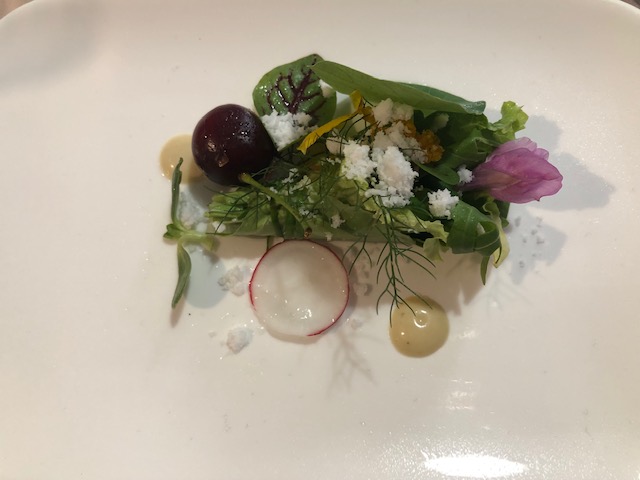
Matea Višić
The culinary tour began with sardines and anchovies, sauerkraut and kale, a Diocletian-inspired Caesar, and butter with garum on bread for the snacks.
For the second course, guests enjoyed tuna prosciutto, tuna sausage, and bottarga. The third course was adorned with saffron biscuits, marinated anchovies, and an anchovies ice cream, followed by three different marinades, green olives, pickled veggies and garum.
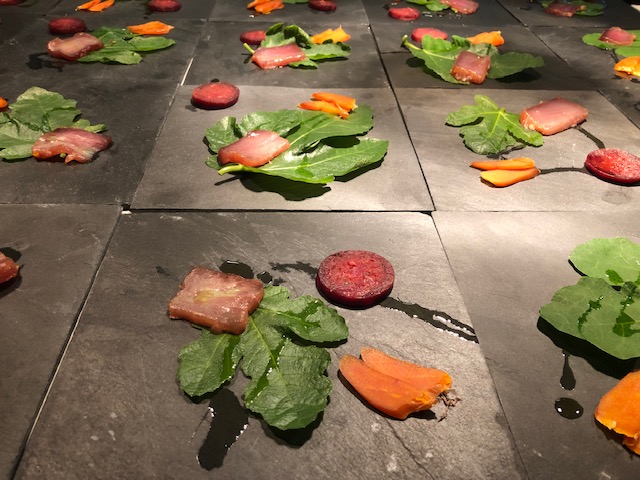
Matea Višić
Next up was the barley orzoto with a spicy Dalmatian šalša, sashimi of tuna pancetta and foam of Pecorino Romano cheese - and then, wild pigeon, textured beets, hazelnuts, varenik, and a date foie gras.
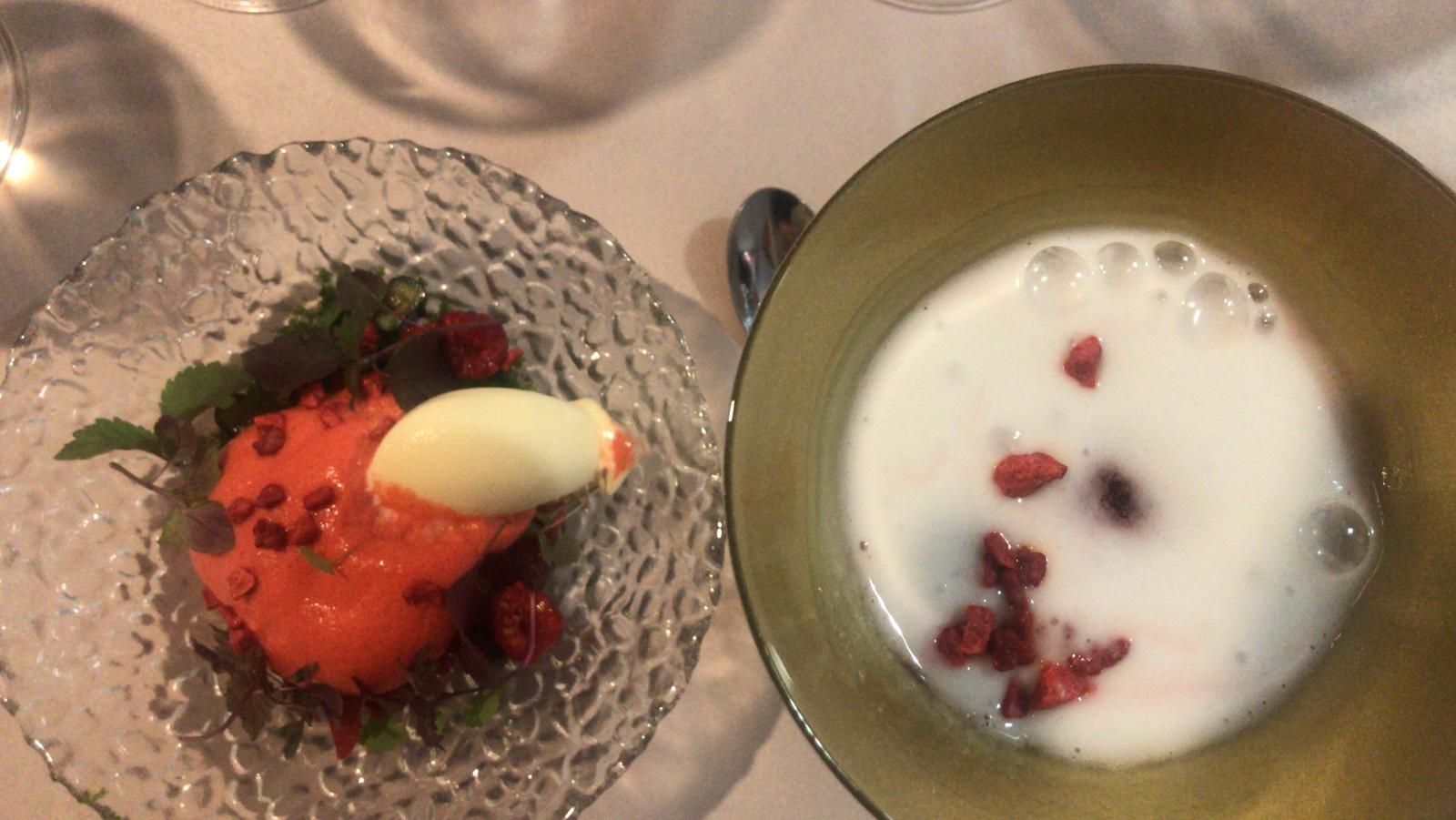
Matea Višić
And for dessert? A cosmopolitan of hydrated strawberries with a lime espuma, a fruit cocktail with smoked goat’s milk ice cream, and oenogarum - garum diluted with wine.
To read more about lifestyle in Croatia, follow TCN’s dedicated page.
Negotiations with Hajduk at Standstill: Is Ultra Europe Moving to Park Mladeži?
The drama between Ultra Europe and Hajduk continues, as negations remain at a dead end. Radio Split reported on Friday morning that the Ultra Europe festival would be held at the RNK Split stadium, also known as Park Mladeži, instead of the current location at Poljud stadium, Slobodna Dalmacija announced on June 14, 2019.
Since no agreement has been signed between Ultra and Hajduk, the festival organizers have allegedly turned to alternative solutions, and Park Mladeži was the first location that came to mind.
As Radio Split reported, the negotiations between representatives of Ultra and Javne ustanova športski objekti Split (Public Institution Sports Facilities Split) have begun, though the City of Split still does not want to confirm this information, and all inquiries from the media remain unanswered.
RNK Split, the concessionaire of Park Mladeži, was also unable to provide any official information on where the Ultra Europe festival would be held this year. Allegedly, all official reports on the state of Ultra Europe will be released at the beginning of next week.
“We've been working intensely over the last few weeks. I believe we will have quality information next week. We are looking for a win-win situation in which everyone will be satisfied; Hajduk and the interest of sport, then the development of tourism and the further stimulation of Ultra, which we know will stay here for a few more years, as well as the many tourists, which we expect this year too and we will host,” said the mayor of Split Andro Krstulović Opara on Thursday.
Recall, Hajduk has highlighted the destruction of their field after Ultra as one of the biggest problems brought by the festival, which is part of why the sides have been unable to agree.
Hajduk was looking for Ultra to cover all the costs incurred by the club for holding the festival, and above all to financially cover and secure a new field in time as to not repeat, for example, last year’s catastrophe when the lawn was not brought in on time.
For every unplayed European match at Poljud, Hajduk is forced to relocate (to the significantly smaller stadium capacity in Dugopolje), leaving them with estimated losses of around 1.5 to 2 million kuna, while the price of the new field is between 1.6 and 2.2 million kuna.
And it's already too late to buy and deliver a new field if you're looking to have it installed right after Ultra...
Stay tuned.
To read more about lifestyle in Croatia, follow TCN’s dedicated page.
New Terminal At Split Airport to Open in "Approximately Two Weeks"
With the ongoing news about Croatia’s new metro and soon-to-be one-way traffic regulation at the ferry port, we’ve nearly forgotten about the second-largest investment project in Dalmatia next to the Pelješac bridge - the new (and highly anticipated) terminal at Split Airport.
While we've reported over the last six months that the new terminal is scheduled to open in June, with Croatia’s Minister of Sea, Transport and Infrastructure Oleg Butković confirming in March that the more than 450 million kuna terminal and its additional facilities were progressing faster than planned, today we finally have a more concrete answer on the official opening date of the ‘new’ Split Airport - and it is in approximately two weeks.
Namely, Ex Yu Aviation reports that Split Airport's new passenger terminal is set to open on schedule, and in approximately two weeks, though the exact date is still unknown. Technical checks are currently underway at the site, after which the Croatian Ministry for Construction and Spatial Planning will issue an operating permit.
Recall, the new terminal will spread across 50,000 square meters, which is a significant improvement compared to the current 14,000. The will be 30 check-in counters, 6 exits, 5 luggage carousels, a new sorting facility, parking for 900 cars, a station for 49 buses, and a 120-meter-long air-conditioned pedestrian bridge that connects it all. There will also be a lounge for business class passengers, an observation deck, and more restaurants. You can see the progress of the airport back in March here.
“This additional space will enable us to handle 2,500 passengers per hour instead of the current 2,000. That totals 40,000 travelers per day,” said Lukša Novak, Split Airport’s general manager.
"On an annual basis, the extra capacity will enable us to handle an additional one million passengers. Depending on tourism industry trends, this terminal should cater to our needs over the next fifteen years. We expect new routes to be launched once the new terminal opens. Each year we expand with some five or six new destinations. We are currently linked with around 100 cities or some fifty countries. We expect for this trend to continue in the coming years,” added Novak.
Split Airport expects to see 5-10% growth in passengers this year.
To read more about travel in Croatia, follow TCN’s dedicated page.
Let's Split: The Amazing Race Discovers Croatia in Season 31 (VIDEO)
June 13, 2019 - The popular CBS series The Amazing Race aired a brand new episode in the United States on June 12, 2019. Namely, the 9th episode of season 31 (yes, you heard that right) titled ‘Let’s Split’ discovers Croatia, and primarily the former home of Emperor Diocletian - Split.
“Teams take a bumpy ride in Split, Croatia and try not to get tongue-twisted reciting poetry while in motion,” writes CBS about the episode, which saw the remaining six teams travel from Brienz, Switzerland to Croatia to begin their mission at Bačvice beach (though they call it Kašjuni in the show).
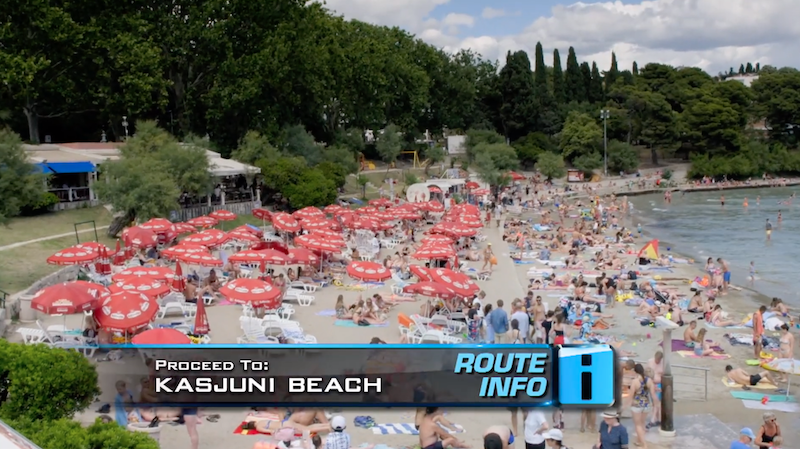
The episode follows the teams from Bačvice, where they are tasked with serving drinks to groups of beachgoers (who are hiding the Travelocity gnome) at cafe bar Žbirac. From there, the mission takes them to Marjan hill and the famous church built into its cliffs. And the task? Delivering bread, of sorts.
The next stop of the mission is Kašjuni beach, where the competitors chose between two challenges - “Poetry in Motion” and “Washed In from the Ocean”. Namely, the teams could opt for memorizing a poem while riding on a flying tube and proceeding to pronounce it correctly to pass, or snorkeling with metal detectors to find a golden goblet and five coins to get their next clue.
From Kašjuni the team sped to Diocletian’s Palace, where the competitors had to carefully follow the quick-moving formation of 18 Roman soldiers.
To get to the finish line, the teams rowed from the Split port to Matejuška where they were greeted by a group of Dalmatian dogs.
You can see episode 9 in its entirety below.
To read more about lifestyle in Croatia, follow TCN’s dedicated page.
Everyone to Bačvice: Summer Cinema Season Begins, 12th FMFS Opens Tonight!
This year's Mediterranean Film Festival in Split begins tonight at 9:30 pm at the always beautiful Bačvice Summer Cinema, reports Dalmatinski Portal Portal on June 13, 2019.
The favorite festival opens with the Italian film ‘Piranhas’, a silver medalist at the last Berlinale. The film is an adaptation of the novel 'Paranza dei bambini' by Roberto Saviano, who has been under strict police protection for a long time due to his astonishing books about the infamous Mafia organization 'Camorra'.
During the first evening, the audience in Split will also have the opportunity to watch the film ‘Dok je trajao Roland Garros’ directed by Snježana Tribuson, which will be screened as part of 'Ješke’, a short film program by Croatian authors.
In the 12th FMFS program, which traditionally opens the outdoor cinema season in Split, there are 70 titles from 32 countries. The people of Split and their guests will be the first in the region to see the films featuring the most famous French actresses - ‘Celle que nous croyez’ with Juliette Binoche and ‘Une jeunesse dorée’ with Isabelle Huppert, while the real treat for the audience is 'Loro' by Paolo Sorrentino.
It is important to note that in the competition for the best feature film is the latest addition by the recently deceased European filmmaker Agnes Varda, the winner of the second FMFS. Furthermore, this year's festival program is abundant with several exciting thrillers and documentaries from the Mediterranean countries, as well as South America and Sweden, which have won the prizes at the most important international film festivals.
Like every year, FMFS gives special attention to Croatian short films in the "Ješke" program, which is shown before the top feature titles and gives the directors a rare opportunity to show their work to a large number of viewers. Also, not only did these films get a prime time spot, but 15 of the shorts are fighting for 12,000 kuna, the most significant prize money a Croatian film festival has awarded in this film genre.
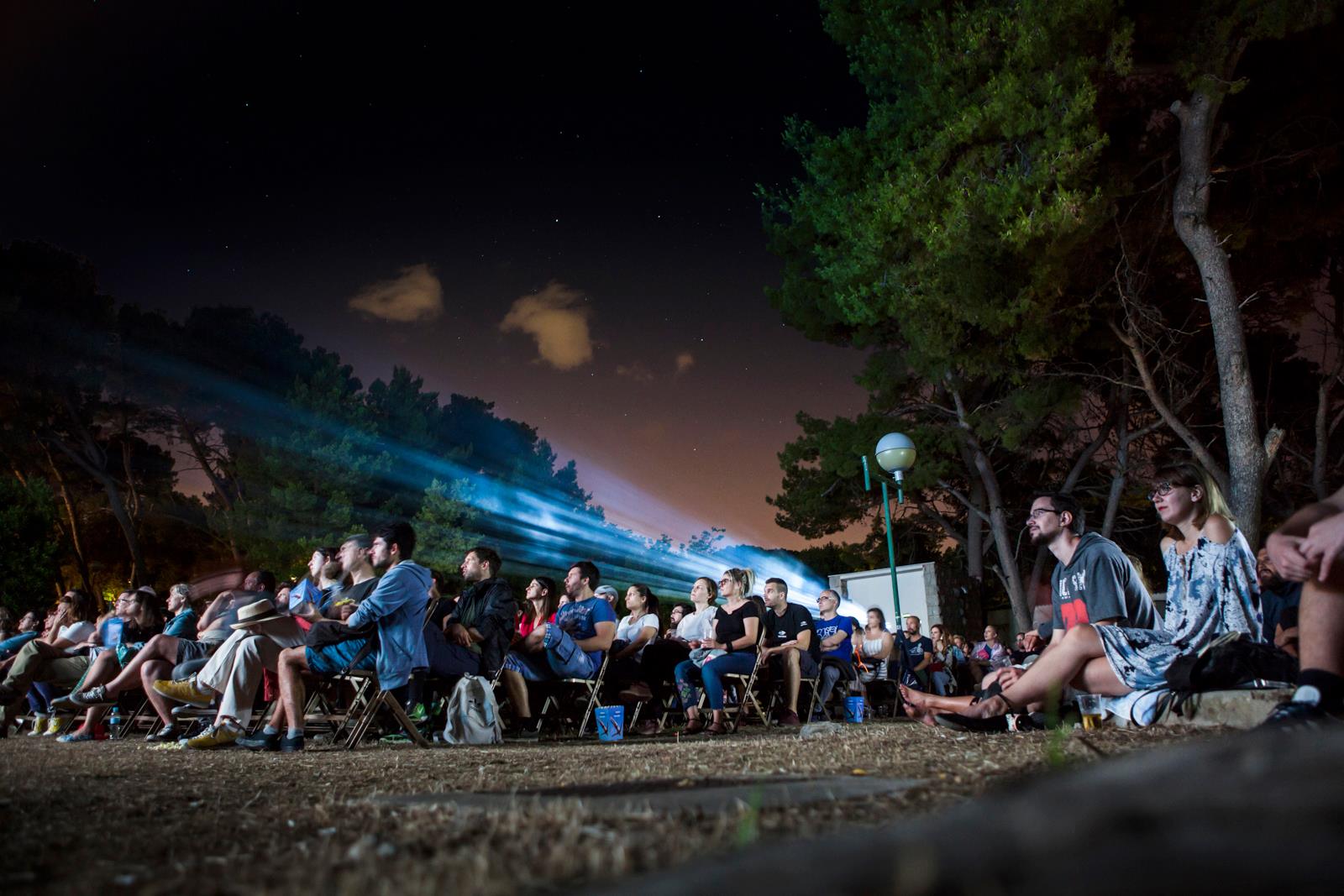
FMFS Facebook
All this is more than enough reason to kick off summer at the FMFS, by the sea, under the pines, until June 22 - and don’t forget, the after parties are the best!
Individual tickets are sold at a price of only 25 kuna for the films in the Bačvice summer cinema, and 20 kuna for screenings at 'Golden Gate'. Projections at the third location of the festival, which opens on Friday besides the Youth Center, are free of charge.
You can find the full program for FMFS here.
To read more about lifestyle in Croatia, follow TCN’s dedicated page.
Will Croatia National Team Play in Split? Latest Between HNS and Hajduk
The Croatia Football Federation announced on Wednesday that the Croatia national team would play the next Euro 2020 home qualifier against Hungary on October 10, 2019, at Poljud stadium in Split. The call was made after a unanimous decision by the HNS Executive Board.
Thus, after Croatia defeated Wales in Osijek and plays their next qualifiers in Slovakia and Azerbaijan in September, in October, the national team will return to Split after four years.
While this all seems fine and dandy and is precisely what Hajduk and the City of Split were hoping for in the end (give or take), one precious detail was left out - HNS failed to inform Hajduk and the City of Split of their final decision, leaving them to find out thanks to the slew of Croatian media reports on Wednesday.
With a long tradition of tension already established between HNS and Hajduk and a relationship that blows hot and cold, you can imagine this wasn’t easy to swallow for the Split club.
Namely, after announcements of the game in Split, Hajduk revealed on their official Facebook page that they learned of the Federation's decision thanks to the media.
"We did not receive any official information on this news, we learned about it from the media."
And then everyone started talking.
Hajduk President Marin Brbić called this decision imprudent and assessed that it was an expression of disrespect towards Hajduk.
“As a rule, the decision on who will host the national team should be a matter of agreement between the Federation as an organizer and Hajduk as a host (regardless of the fact that the formal host may be the City of Split as the stadium owner). For the first time, such a decision was made without any agreement with the club or, as far as it is known, the host city.
The fact is that the wider public is divided about the Federation’s relationship with Hajduk, and making a one-sided decision shows thoughtlessness, disrespect, and potent antagonism. Building an atmosphere of renewed confidence and creating preconditions for better and quality relations is in favor of all players of Croatian football, while making one-sided decisions makes it impossible and counterproductive because it discredits those people who are ready to talk and negotiate, and gives the right to those who are solely for the conflict. It is obvious that this is an assessment of the people in the Federation who think this is a good time to emphasize existing tensions.
Looking ahead, the Federation’s concrete measures that will shape the future of Croatian football will show whether this hasty one-sided decision was made under pressure from the term expiring to determine the host, or as the result of their poor assessment.
If this decision was made separately from topics that were or should only be the subject of talks and negotiations on the future of Croatian football and the fair and transparent relationship, for which Hajduk is very interested in, in that case, HNS assumes the sole responsibility for the organization of the match,” said Brbić.
The City of Split also confirmed they were not informed of this decision.
“The City of Split did not receive any official information on the decision of the Croatian Football Federation to hold the match between Croatia and Hungary at Poljud.
Since the meeting held in late April, which included the mayor, Hajduk president Marin Brbić and the president of the Supervisory Board, Benjamin Perasović, neither the mayor nor anyone in the city administration had any contact with the heads of HNS."
Split Mayor Andro Krstulović Opara also commented on the matter on Thursday, reports Dalmatinski Portal.
“Very surprising, even though it does not surprise me when such decisions are made by Šuker and Society. I have spent my life in diplomacy and administration and other bodies, I have been in numerous talks and negotiations, and to realize common goals, it is necessary to speak frankly.
It will still be held,” he continued.
While HNS has not officially come out to comment on the matter, Index.hr was able to reach HNS Executive Director Marijan Kustić.
"In December 2018, Hajduk said they were interested in one of two matches, Slovakia or Hungary, and we made a unanimous decision that we would like to play the game, of course, in Split,” Kustić said, adding:
"The statement signed by HNK Hajduk and President Huljaj stands and we have accordingly decided to play in Split.
The leaders of Hajduk, the City of Split and HNS met in Zagreb in late April and this was a step towards improving relations, and now everything is in Split. They will soon respond if they want the match. We spoke about the relations between Hajduk and the Croatian Football Federation and I think that we should not make any ultimatums when it comes to the Croatia national team itself,” said Kustić. Recall, Hajduk sent a list of requests to HNS back in December last year when the two sides first discussed Split hosting a Euro qualifier.
Kustić also spoke to Sportske Novosti on Wednesday evening.
“The Executive Committee unanimously accepted the candidacy of Split and Poljud to host the match against Hungary on October 10th. So, the candidacy exists and was signed by then-President Hajduk Jasmin Huljaj on December 7 last year. On this occasion, Hajduk also competed for the match against Slovakia in November.
We received requests from Zagreb, Rijeka, Pula, and Osijek, but we chose Split. A few days ago, we were extremely well received in Split and Omiš, and the coach and players expressed the desire to welcome Hungary at Poljud, and the Executive Board accepted it.”
Has HNS already confirmed Split as a host to UEFA?
“We did not, because the next step is to talk to representatives of the City of Split and Hajduk. They were a candidate, we chose them, and now we have to arrange details about the organization of the match. I expect that we will in the next few days.”
Judging by the reaction from Poljud and the City of Split, they might refuse to host the game at all.
“I do not want to prejudge anything. After we decided on Poljud, we immediately received hundreds of ticket requests, as well as many congratulations. Everyone in the Federation wants Poljud, and the players want it as well as thousands of fans from Split and Dalmatia,” concluded Kustić.
So, what will happen next? Stay tuned.
To read more about sport in Croatia, follow TCN’s dedicated page.


